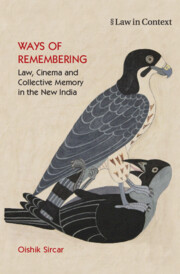
- Publisher:
- Cambridge University Press
- Online publication date:
- April 2024
- Print publication year:
- 2024
- Online ISBN:
- 9781009072182
- Subjects:
- Law: General Interest, Film, Socio-Legal Studies, Law, Film, Media, Mass Communication, Jurisprudence
- Series:
- Law in Context

